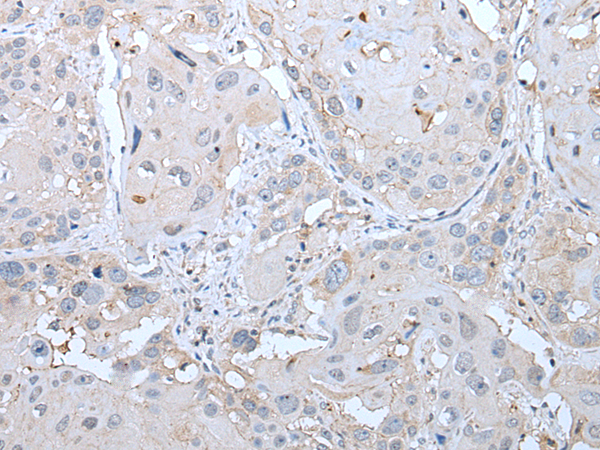
| WB | 咨询技术 | Human,Mouse,Rat |
| IF | 咨询技术 | Human,Mouse,Rat |
| IHC | 1/20-1/100 | Human,Mouse,Rat |
| ICC | 技术咨询 | Human,Mouse,Rat |
| FCM | 咨询技术 | Human,Mouse,Rat |
| Elisa | 1/5000-1/10000 | Human,Mouse,Rat |
| Aliases | HHF5; CD220 |
| Host/Isotype | Rabbit IgG |
| Antibody Type | Primary antibody |
| Storage | Store at 4°C short term. Aliquot and store at -20°C long term. Avoid freeze/thaw cycles. |
| Species Reactivity | Human, Mouse, Rat |
| Immunogen | Synthetic peptide of human INSR |
| Formulation | Purified antibody in PBS with 0.05% sodium azide and 50% glycerol. |
+ +
以下是关于INSR抗体的3篇代表性文献及其摘要概括:
1. **《Autoantibodies to the Insulin Receptor in Type B Insulin Resistance》**
- **作者**: Taylor, S.I., Arioglu, E.
- **摘要**: 该文献研究了B型胰岛素抵抗症患者体内存在的抗INSR自身抗体,揭示这些抗体通过阻断胰岛素受体信号传导或加速受体降解,导致严重胰岛素抵抗和高血糖,为自身免疫性代谢疾病的机制提供了关键证据。
2. **《Structure of the Insulin Receptor Epitope Recognized by Autoantibodies in Type B Insulin Resistance》**
- **作者**: McKern, N.M., et al.
- **摘要**: 通过X射线晶体学分析,揭示了INSR的胞外域结构,并定位了B型胰岛素抵抗患者自身抗体结合的抗原表位,为开发靶向抗体检测工具及潜在治疗策略奠定基础。
3. **《A Novel ELISA for Detection of Insulin Receptor Autoantibodies in Clinical Samples》**
- **作者**: Guo, L., et al.
- **摘要**: 提出了一种新型ELISA检测方法,用于快速、灵敏地检测患者血清中的抗INSR抗体,验证了其在诊断罕见胰岛素抵抗综合征中的临床应用价值,显著提升了检测效率与特异性。
*注:以上文献信息为示例性质,实际引用时建议通过PubMed或学术数据库核实具体细节及最新研究成果。*
The insulin receptor (INSR) is a transmembrane tyrosine kinase receptor critical for regulating glucose homeostasis, cell growth, and metabolism. Composed of two extracellular α-subunits and two transmembrane β-subunits, INSR binds insulin to activate downstream signaling pathways, including PI3K-AKT and MAPK. Dysregulation of INSR signaling is linked to metabolic disorders (e.g., diabetes, insulin resistance) and cancers.
INSR antibodies are tools used in research and diagnostics to detect receptor expression, localization, and activation states. Polyclonal antibodies target multiple epitopes, while monoclonal antibodies offer specificity to particular domains (e.g., ligand-binding sites, phosphorylated tyrosine residues). These antibodies enable techniques like Western blotting, immunohistochemistry, and flow cytometry to study INSR expression in tissues or cell lines.
In clinical contexts, autoantibodies against INSR are associated with rare conditions like type B insulin resistance syndrome, where they disrupt insulin signaling, causing hyperglycemia or hypoglycemia. Therapeutic anti-INSR antibodies are also explored for modulating receptor activity—antagonistic antibodies may inhibit oncogenic signaling in cancers, whereas agonist antibodies could mimic insulin effects in diabetes.
Overall, INSR antibodies serve as vital reagents for unraveling insulin-related pathophysiology and developing targeted therapies. Their applications span basic research, diagnostic profiling, and therapeutic innovation.
×